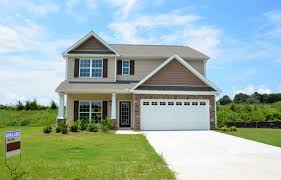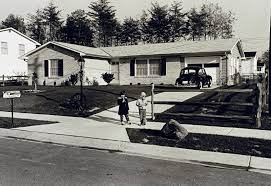INTRO TO REAL ESTATE INVESTING
What Kind of Real Estate Should I Invest In?

Perhaps the first step you should take before buying any real estate is to carefully evaluate what your long-term goals are. To do this you'll need to be more specific than just saying "my goal is to make money" or "my goal is to build wealth".
Some common goals for real estate investing might include the following:
- I want to buy my dream home
- I want to build an estate I can pass on to my kids
- I want to build a source of passive income to supplement my day job
- I want to retire early
- I want to fund my children's education
Adopt a Goal-Based Investing Strategy
There are different real estate investing strategies to achieve each of these goals. Depending on your long-term objectives you may decide to invest in different types of properties.
For example, if you're goal is to build a source of passive income you may decide to invest in rental properties and become a landlord. Whereas if your goal is to build a large estate for your kids to inherit, you might be looking to invest in larger commercial properties. Alternatively, if you are looking for a way to fund your child's education, you may consider flipping a property for a quick profit.
Your previous experience with real estate and your comfort level with managing properties and performing repairs should also play a factor in determining what kind of property to invest in.
For example, if you have had little experience with real estate and you can't tell a screwdriver from a hammer, you may be like the idea of investing in a condo with an HOA. A condo is nice because you aren't responsible for maintaining the exterior of the home in any way. And an HOA is nice because it means you don't need to worry about mowing the lawn, shoveling the snow, or performing any other similar maintenance tasks. Additionally, condos are often smaller and cheaper than other properties. These attributes can make condos a great option for a new investor because there is less work involved than many other property types.
Alternatively, if you are comfortable with a little more risk, and with performing repairs yourself or hiring a contractor to perform repairs, you may be more inclined to purchase a fixer-upper, or even try buying a foreclosure property at an auction on the courthouse steps. Properties like this have more risk and more work involved, but the payoff can also be more.
Types of Property
There are many different property types you can purchase, and each has pros and cons. Below is a list of some of the most common:
- Condo
- Townhouse
- Single-Family Home
- Commercial Property
Let's look at each of these in a little more depth.
Condo
When you buy a condo, you are essentially buying the inside of a box. You own the space, but you don't own the exterior, or the land it sits on. One upside to this is that you have less maintenance to worry about. One downside is that you aren't able to may any improvements to the curb appeal of your property. You only have control of how the inside looks. Additionally, almost all condos have an HOA that will have some set of rules you need to follow. The HOA dues may be higher than other property types as well because the HOA is responsible for doing all of the exterior maintenance in addition to landscaping, trash collection, and other services.
A condo is typically a small, single unit. This means if you choose to rent it out, you will likely be renting to a young couple or single person, or perhaps an old person who is downsizing and doesn't need much space. Condos may have a higher turnover rate than other properties because of their small size. For example, if you rent to a young couple when they start to have kids and their family grows, they may need more space and thus have to move.
Condos can be a great choice for new investors because they require less capital to get started, and they are easier to manage. Their low maintenance requirements also make them a great choice for investors who live out of state and aren't able to visit the property regularly.
Townhouse
As opposed to a condo, when you buy a townhouse, you buy the entire building and the land it sits on. This means you are free to make changes to the interior, exterior, or landscaping of the building as long as they comply with the rules the HOA imposes. This is both good and bad for an investor. One good aspect is that it is easier to make improvements to the property that could increase its value. One bad aspect is that it may require more time and effort to maintain the property.
Also, townhomes often have a distinct architecture that makes them recognizable as a townhome. In many cases, homebuilders try to cram a lot of townhomes into a small space. And as a result, townhomes are often two or three-story buildings, and it's not uncommon to share a wall with a neighbor. Townhomes also vary in size and price, you can find small 1 bed, 1 bath townhomes or large 4 bed 3 bath townhomes, or anywhere in between.
Townhomes are a sort of middle ground between a condo and a traditional home. They are a great option for young families who need more space than a condo, and who either can't afford or don't want the responsibilities of a full-size home. If you buy a townhome as an investment property you will likely find that you are renting or selling to these types of people.
Single-Family Home
A single-family home is perhaps the most common type of property available and is what most people think of first when they think of real estate. Unlike condos or townhomes, single-family homes don't share walls or land with other properties.
Single-family homes are often a good starting spot for new investors because traditional homes are something that most people are familiar with. Most people can walk into a home and intuitively feel if something is off. Perhaps the layout isn't functional, or you notice there is no room for a kitchen table anywhere.
Another element that makes single-family homes attractive for investors is they are effective at providing multiple options for different investing strategies. For example, you can make money by remodeling and flipping a home, or you can buy a home to use as a rental property. You can even buy a home to live in and rent out your basement or mother-in-law apartment if you have the space.
Commercial Property
Commercial properties are real estate that is used for business activities. This is a broad blanket that covers a large subset of property types. Commercial property can include raw land, warehouses, multi-tenant apartment buildings, hotels, car washes, strip malls, and too many other properties to list here.
Commercial properties differ from residential properties in several ways. One of the most crucial differences between commercial properties and residential properties is the types of tenants. Finding a tenant for a commercial property often takes longer than finding a tenant for a residential property. However, once you find a good tenant, they are likely to stay for a much longer period. This is because it's more difficult for them to move. Consider for example a dentist's office. A dentist has to make many customizations to a property by adding extra sinks, outlets, and expensive equipment. Additionally, they invest a lot of resources into building a loyal customer base. It is very expensive for a dentist to move locations, so once they settle into a good area, they are likely to stay there for a long time.
Commercial properties are often more difficult for investors to get started in because they are typically larger transactions, and it can often be more difficult to get financing.
Develop a Strategy That Meets Your Goals
When evaluating what kind of real estate to invest in, it's important to consider what your financial goals are, where your experience and comfort levels are, and what type of real estate you want to use as your investment vehicle. Clearly outlining your goals and your strategy to achieve your goals is one of the best ways to increase your odds of success.
Related Posts



